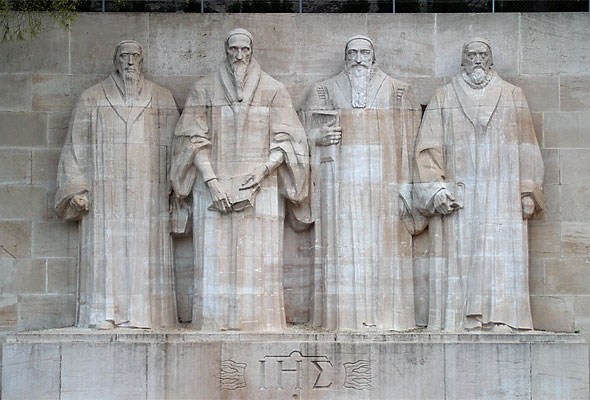
Huguenots
The Huguenots (/ˈhjuːɡənɒts/ HEW-gə-nots, UK also /-noʊz/ -nohz, French: [yɡ(ə)no]) were a religious group of French Protestants who held to the Reformed (Calvinist) tradition of Protestantism. The term, which may be derived from the name of a Swiss political leader, the Genevan burgomaster Besançon Hugues (1491–1532), was in common use by the mid-16th century. Huguenot was frequently used in reference to those of the Reformed Church of France from the time of the Protestant Reformation. By contrast, the Protestant populations of eastern France, in Alsace, Moselle, and Montbéliard, were mainly Lutherans.
For other uses, see Huguenot (disambiguation).
In his Encyclopedia of Protestantism, Hans Hillerbrand wrote that on the eve of the St. Bartholomew's Day massacre in 1572, the Huguenot community made up as much as 10% of the French population.[1] By 1600, it had declined to 7–8%, and was reduced further late in the century after the return of persecution under Louis XIV, who instituted the dragonnades to forcibly convert Protestants, and then finally revoked all Protestant rights in his Edict of Fontainebleau of 1685.
The Huguenots were concentrated in the southern and western parts of the Kingdom of France. As Huguenots gained influence and more openly displayed their faith, Catholic hostility grew. A series of religious conflicts followed, known as the French Wars of Religion, fought intermittently from 1562 to 1598. The Huguenots were led by Jeanne d'Albret; her son, the future Henry IV (who would later convert to Catholicism in order to become king); and the princes of Condé. The wars ended with the Edict of Nantes of 1598, which granted the Huguenots substantial religious, political and military autonomy.
Huguenot rebellions in the 1620s resulted in the abolition of their political and military privileges. They retained the religious provisions of the Edict of Nantes until the rule of Louis XIV, who gradually increased persecution of Protestantism until he issued the Edict of Fontainebleau (1685). This ended legal recognition of Protestantism in France and the Huguenots were forced to either convert to Catholicism (possibly as Nicodemites) or flee as refugees; they were subject to violent dragonnades. Louis XIV claimed that the French Huguenot population was reduced from about 900,000 or 800,000 adherents to just 1,000 or 1,500. He exaggerated the decline, but the dragonnades were devastating for the French Protestant community. The exodus of Huguenots from France created a brain drain, as many of them had occupied important places in society.[2][3][4]
The remaining Huguenots faced continued persecution under Louis XV. By the time of his death in 1774, Calvinism had been all but eliminated from France. Persecution of Protestants officially ended with the Edict of Versailles, signed by Louis XVI in 1787. Two years later, with the Revolutionary Declaration of the Rights of Man and of the Citizen of 1789, Protestants gained equal rights as citizens.[5]